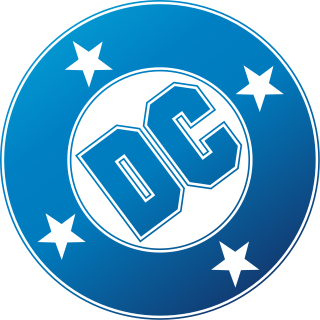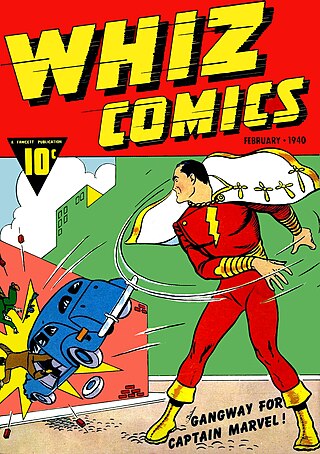Wonder Man is a Marvel comic book superhero.
Wonder Man may also refer to:

DC Comics, Inc. is an American comic book publisher and the flagship unit of DC Entertainment, a subsidiary of Warner Bros. Discovery. DC is an initialism for "Detective Comics", an American comic book series first published in 1937.

A superhero or superheroine is a stock character who typically possesses superpowers or abilities beyond those of ordinary people, is frequently costumed concealing their identity, and fits the role of the hero; typically using their powers to help the world become a better place, or dedicating themselves to protecting the public and fighting crime. Superhero fiction is the genre of fiction that is centered on such characters, especially, since the 1930s, in American comic books, as well as in Japanese media.
The Silver Age of Comic Books was a period of artistic advancement and widespread commercial success in mainstream American comic books, predominantly those featuring the superhero archetype. Following the Golden Age of Comic Books, the Silver Age is considered to cover the period from 1956 to 1970, and was succeeded by the Bronze Age.

The Justice League, or Justice League of America (JLA), is a group of superheroes appearing in American comic books published by DC Comics. The team first appeared in The Brave and the Bold #28. Writer Gardner Fox conceived the team as a revival of the Justice Society of America, a similar team from DC Comics from the 1940s which had been pulled out of print due to a decline in sales. The Justice League is an all-star ensemble cast of established superhero characters from DC Comics' portfolio. Diegetically, these superheroes usually operate independently but occasionally assemble as a team to tackle especially formidable villains. This is in contrast to certain other superhero teams such as the X-Men, whose characters were created specifically to be part of the team, with the team being central to their identity. The cast of the Justice League usually features a few highly popular characters who have their own solo books, such as Superman, Batman, and Wonder Woman, alongside several lesser-known characters who benefit from exposure.
Marvel may refer to:
See also: 1930s in comics, 1950s in comics and the list of years in comics
Death, in comics, may refer to:
Michael Anglo was a British comic book writer, editor and artist, as well as an author. He was best known for creating the superhero Marvelman, later known as Miracleman.
Shazam may refer to:

National Comics Publications v. Fawcett Publications, 191 F.2d 594. was a decision by the United States Court of Appeals for the Second Circuit in a twelve-year legal battle between National Comics and the Fawcett Comics division of Fawcett Publications, concerning Fawcett's Captain Marvel character being an infringement on the copyright of National's Superman comic book character. The litigation is notable as one of the longest-running legal battles in comic book publication history.
Fox Feature Syndicate was a comic book publisher from early in the period known to fans and historians as the Golden Age of Comic Books. Founded by entrepreneur Victor S. Fox, it produced such titles as Blue Beetle, Fantastic Comics and Mystery Men Comics.

Wonder Man is a fictional superhero created by American cartoonist Will Eisner, whose only appearance was in the comic book Wonder Comics #1. The character is of some historical significance due to a lawsuit that resulted from his only appearance.
Wonder Woman is a DC comic book superhero.
Daredevil may refer to:
Strange may refer to:
El Muerto is a Spanish term that translates as "The Dead One". It may refer to:

Superhero fiction is a subgenre of speculative fiction examining the adventures, personalities and ethics of costumed crime fighters known as superheroes, who often possess superhuman powers and battle similarly powered criminals known as supervillains. The genre primarily falls between hard fantasy and soft science fiction in the spectrum of scientific realism. It is most commonly associated with American comic books, though it has expanded into other media through adaptations and original works.

Superhero comics is one of the most common genres of American comic books. The genre rose to prominence in the 1930s and became extremely popular in the 1940s and has remained the dominant form of comic book in North America since the 1960s. Superhero comics feature stories about superheroes and the universes these characters inhabit.
A bouncer is a security guard employed by a nightclub or similar establishment to prevent troublemakers from entering or to eject them from the premises

Detective Comics, Inc. v. Bruns Publications, Inc., 111 F.2d 432, the case of Superman v. Wonderman, is a 1940 decision of the Second Circuit in which the court held that the archetype of a comic book hero, in this case a cape-wearing benevolent-Hercules figure (Superman), is an idea, which the copyright in the comic strips does not protect against copying; only the specific details of the strips, their particular expression, enjoy legal protection. The author of the court's opinion was Judge Augustus N. Hand and the panel of Second Circuit judges included Judge Learned Hand.